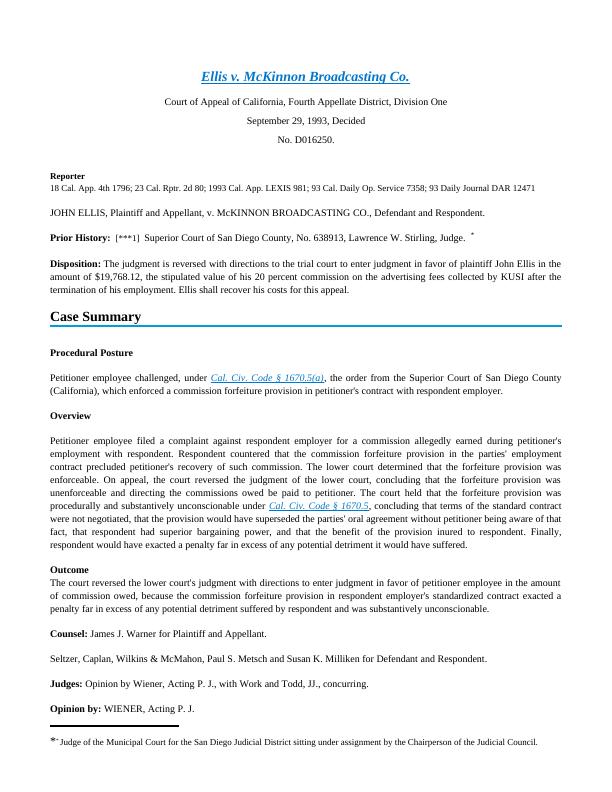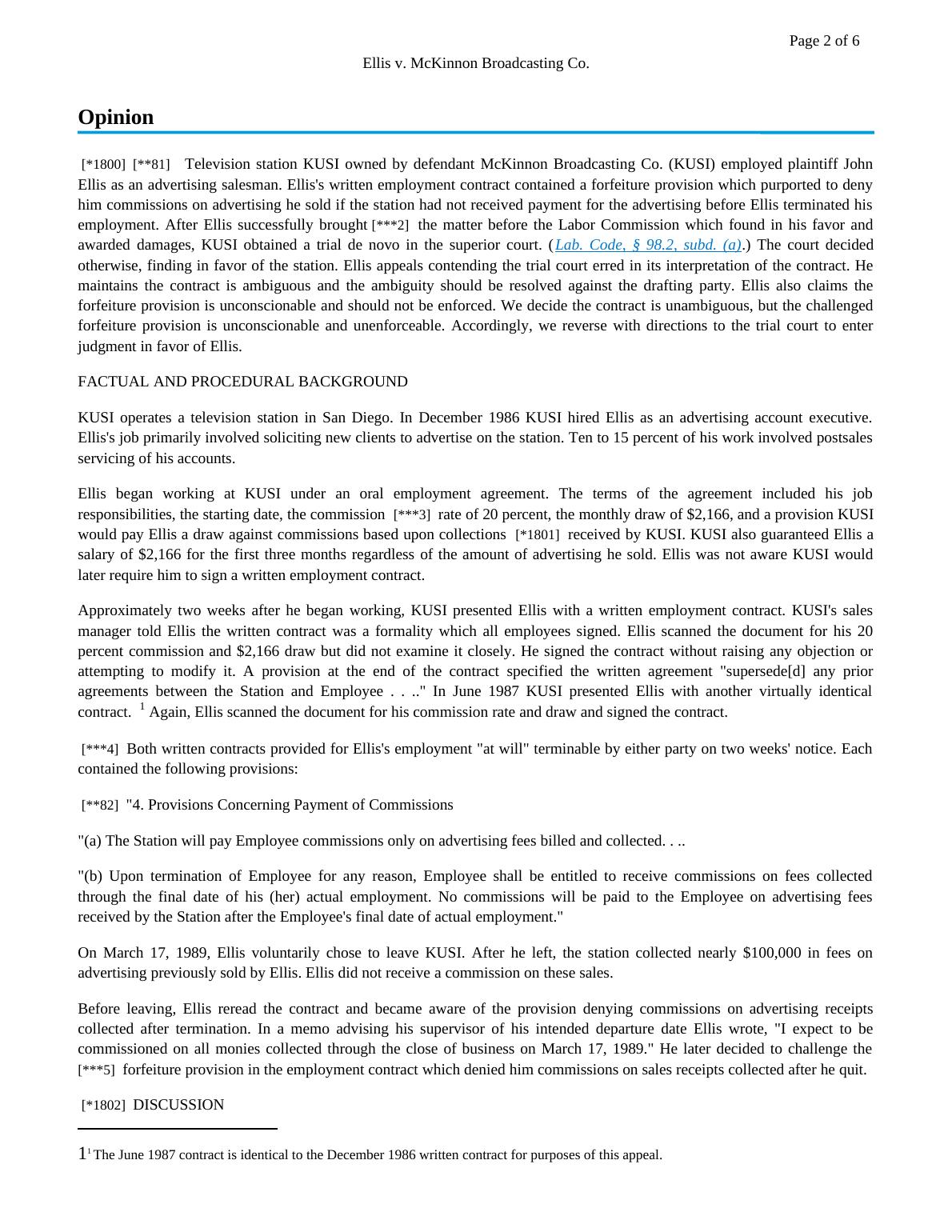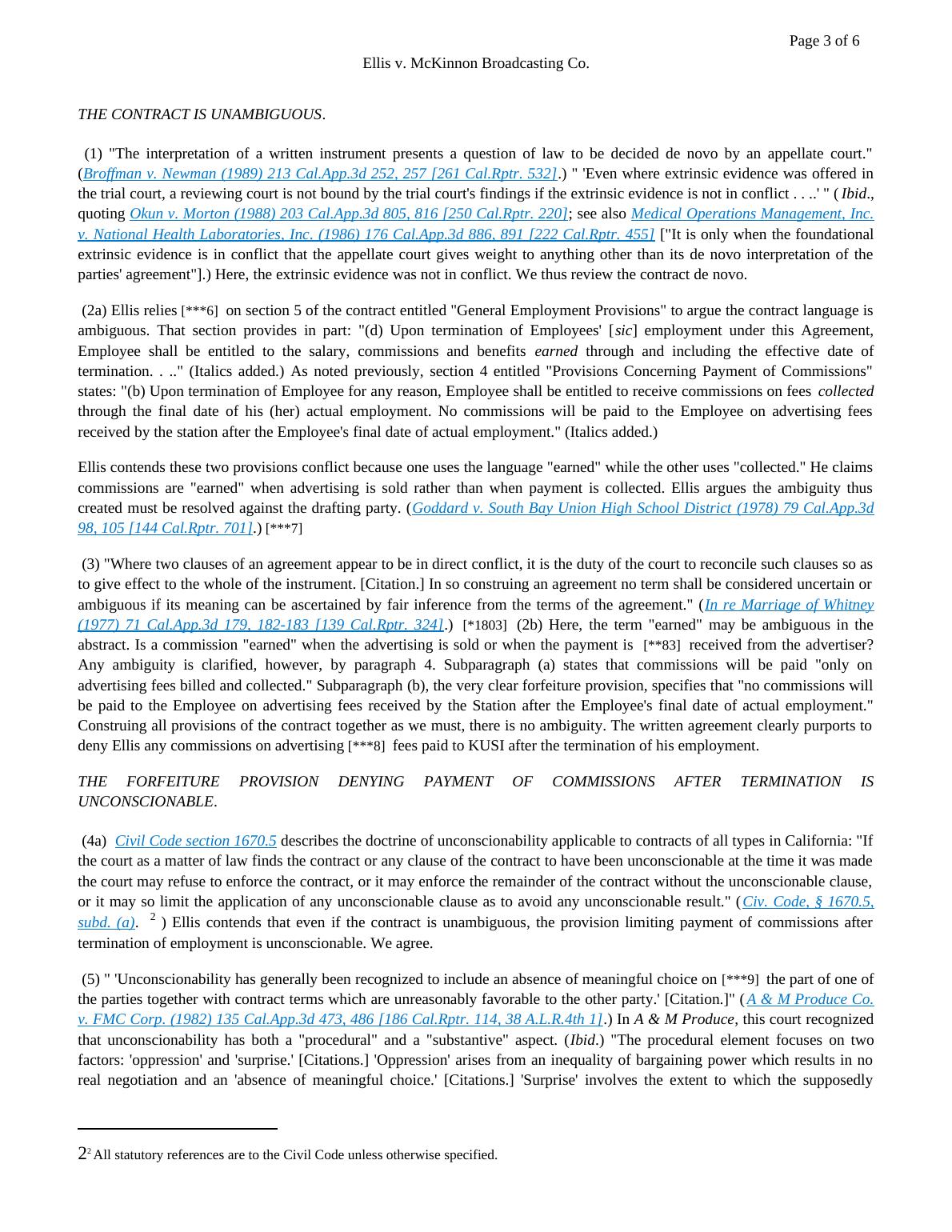Ask a question from expert
Ellis v. McKinnon Broadcasting Co. - Court of Appeal of California Case Summary
6 Pages4166 Words269 Views
Added on 2019-09-20
About This Document
Read the summary of Ellis v. McKinnon Broadcasting Co. case from the Court of Appeal of California, Fourth Appellate District, Division One. The case involves a commission forfeiture provision in an employment contract challenged under Cal. Civ. Code § 1670.5(a). The court found the provision to be unconscionable and unenforceable, and directed the commissions owed be paid to the employee.
Ellis v. McKinnon Broadcasting Co. - Court of Appeal of California Case Summary
Added on 2019-09-20
BookmarkShareRelated Documents
Ellis v. McKinnon Broadcasting Co.Court of Appeal of California, Fourth Appellate District, Division OneSeptember 29, 1993, Decided No. D016250. Reporter18 Cal. App. 4th 1796; 23 Cal. Rptr. 2d 80; 1993 Cal. App. LEXIS 981; 93 Cal. Daily Op. Service 7358; 93 Daily Journal DAR 12471JOHN ELLIS, Plaintiff and Appellant, v. McKINNON BROADCASTING CO., Defendant and Respondent.Prior History:[***1] Superior Court of San Diego County, No. 638913, Lawrence W. Stirling, Judge. *Disposition:The judgment is reversed with directions to the trial court to enter judgment in favor of plaintiff John Ellis in theamount of $19,768.12, the stipulated value of his 20 percent commission on the advertising fees collected by KUSI after thetermination of his employment. Ellis shall recover his costs for this appeal. Case SummaryProcedural PosturePetitioner employee challenged, under Cal. Civ. Code § 1670.5(a), the order from the Superior Court of San Diego County(California), which enforced a commission forfeiture provision in petitioner's contract with respondent employer.OverviewPetitioner employee filed a complaint against respondent employer for a commission allegedly earned during petitioner'semployment with respondent. Respondent countered that the commission forfeiture provision in the parties' employmentcontract precluded petitioner's recovery of such commission. The lower court determined that the forfeiture provision wasenforceable. On appeal, the court reversed the judgment of the lower court, concluding that the forfeiture provision wasunenforceable and directing the commissions owed be paid to petitioner. The court held that the forfeiture provision wasprocedurally and substantively unconscionable under Cal. Civ. Code § 1670.5, concluding that terms of the standard contractwere not negotiated, that the provision would have superseded the parties' oral agreement without petitioner being aware of thatfact, that respondent had superior bargaining power, and that the benefit of the provision inured to respondent. Finally,respondent would have exacted a penalty far in excess of any potential detriment it would have suffered.OutcomeThe court reversed the lower court's judgment with directions to enter judgment in favor of petitioner employee in the amountof commission owed, because the commission forfeiture provision in respondent employer's standardized contract exacted apenalty far in excess of any potential detriment suffered by respondent and was substantively unconscionable.Counsel:James J. Warner for Plaintiff and Appellant. Seltzer, Caplan, Wilkins & McMahon, Paul S. Metsch and Susan K. Milliken for Defendant and Respondent. Judges:Opinion by Wiener, Acting P. J., with Work and Todd, JJ., concurring. Opinion by:WIENER, Acting P. J. **Judge of the Municipal Court for the San Diego Judicial District sitting under assignment by the Chairperson of the Judicial Council.

Page 2 of 6Ellis v. McKinnon Broadcasting Co.Opinion[*1800][**81] Television station KUSI owned by defendant McKinnon Broadcasting Co. (KUSI) employed plaintiff JohnEllis as an advertising salesman. Ellis's written employment contract contained a forfeiture provision which purported to denyhim commissions on advertising he sold if the station had not received payment for the advertising before Ellis terminated hisemployment. After Ellis successfully brought[***2] the matter before the Labor Commission which found in his favor andawarded damages, KUSI obtained a trial de novo in the superior court. (Lab. Code, § 98.2, subd. (a).) The court decidedotherwise, finding in favor of the station. Ellis appeals contending the trial court erred in its interpretation of the contract. Hemaintains the contract is ambiguous and the ambiguity should be resolved against the drafting party. Ellis also claims theforfeiture provision is unconscionable and should not be enforced. We decide the contract is unambiguous, but the challengedforfeiture provision is unconscionable and unenforceable. Accordingly, we reverse with directions to the trial court to enterjudgment in favor of Ellis. FACTUAL AND PROCEDURAL BACKGROUND KUSI operates a television station in San Diego. In December 1986 KUSI hired Ellis as an advertising account executive.Ellis's job primarily involved soliciting new clients to advertise on the station. Ten to 15 percent of his work involved postsalesservicing of his accounts. Ellis began working at KUSI under an oral employment agreement. The terms of the agreement included his jobresponsibilities, the starting date, the commission [***3] rate of 20 percent, the monthly draw of $2,166, and a provision KUSIwould pay Ellis a draw against commissions based upon collections [*1801] received by KUSI. KUSI also guaranteed Ellis asalary of $2,166 for the first three months regardless of the amount of advertising he sold. Ellis was not aware KUSI wouldlater require him to sign a written employment contract. Approximately two weeks after he began working, KUSI presented Ellis with a written employment contract. KUSI's salesmanager told Ellis the written contract was a formality which all employees signed. Ellis scanned the document for his 20percent commission and $2,166 draw but did not examine it closely. He signed the contract without raising any objection orattempting to modify it. A provision at the end of the contract specified the written agreement "supersede[d] any prioragreements between the Station and Employee . . .." In June 1987 KUSI presented Ellis with another virtually identicalcontract. 1 Again, Ellis scanned the document for his commission rate and draw and signed the contract. [***4] Both written contracts provided for Ellis's employment "at will" terminable by either party on two weeks' notice. Eachcontained the following provisions: [**82] "4. Provisions Concerning Payment of Commissions "(a) The Station will pay Employee commissions only on advertising fees billed and collected. . .. "(b) Upon termination of Employee for any reason, Employee shall be entitled to receive commissions on fees collectedthrough the final date of his (her) actual employment. No commissions will be paid to the Employee on advertising feesreceived by the Station after the Employee's final date of actual employment." On March 17, 1989, Ellis voluntarily chose to leave KUSI. After he left, the station collected nearly $100,000 in fees onadvertising previously sold by Ellis. Ellis did not receive a commission on these sales. Before leaving, Ellis reread the contract and became aware of the provision denying commissions on advertising receiptscollected after termination. In a memo advising his supervisor of his intended departure date Ellis wrote, "I expect to becommissioned on all monies collected through the close of business on March 17, 1989." He later decided to challenge the[***5] forfeiture provision in the employment contract which denied him commissions on sales receipts collected after he quit. [*1802] DISCUSSION 11The June 1987 contract is identical to the December 1986 written contract for purposes of this appeal.

Page 3 of 6Ellis v. McKinnon Broadcasting Co.THE CONTRACT IS UNAMBIGUOUS. (1) "The interpretation of a written instrument presents a question of law to be decided de novo by an appellate court."(Broffman v. Newman (1989) 213 Cal.App.3d 252, 257 [261 Cal.Rptr. 532].) " 'Even where extrinsic evidence was offered inthe trial court, a reviewing court is not bound by the trial court's findings if the extrinsic evidence is not in conflict . . ..' " (Ibid.,quoting Okun v. Morton (1988) 203 Cal.App.3d 805, 816 [250 Cal.Rptr. 220]; see also Medical Operations Management, Inc.v. National Health Laboratories, Inc. (1986) 176 Cal.App.3d 886, 891 [222 Cal.Rptr. 455] ["It is only when the foundationalextrinsic evidence is in conflict that the appellate court gives weight to anything other than its de novo interpretation of theparties' agreement"].) Here, the extrinsic evidence was not in conflict. We thus review the contract de novo. (2a) Ellis relies[***6] on section 5 of the contract entitled "General Employment Provisions" to argue the contract language isambiguous. That section provides in part: "(d) Upon termination of Employees' [sic] employment under this Agreement,Employee shall be entitled to the salary, commissions and benefits earned through and including the effective date oftermination. . .." (Italics added.) As noted previously, section 4 entitled "Provisions Concerning Payment of Commissions"states: "(b) Upon termination of Employee for any reason, Employee shall be entitled to receive commissions on fees collectedthrough the final date of his (her) actual employment. No commissions will be paid to the Employee on advertising feesreceived by the station after the Employee's final date of actual employment." (Italics added.) Ellis contends these two provisions conflict because one uses the language "earned" while the other uses "collected." He claimscommissions are "earned" when advertising is sold rather than when payment is collected. Ellis argues the ambiguity thuscreated must be resolved against the drafting party. (Goddard v. South Bay Union High School District (1978) 79 Cal.App.3d98, 105 [144 Cal.Rptr. 701].)[***7] (3) "Where two clauses of an agreement appear to be in direct conflict, it is the duty of the court to reconcile such clauses so asto give effect to the whole of the instrument. [Citation.] In so construing an agreement no term shall be considered uncertain orambiguous if its meaning can be ascertained by fair inference from the terms of the agreement." (In re Marriage of Whitney(1977) 71 Cal.App.3d 179, 182-183 [139 Cal.Rptr. 324].) [*1803] (2b) Here, the term "earned" may be ambiguous in theabstract. Is a commission "earned" when the advertising is sold or when the payment is [**83] received from the advertiser?Any ambiguity is clarified, however, by paragraph 4. Subparagraph (a) states that commissions will be paid "only onadvertising fees billed and collected." Subparagraph (b), the very clear forfeiture provision, specifies that "no commissions willbe paid to the Employee on advertising fees received by the Station after the Employee's final date of actual employment."Construing all provisions of the contract together as we must, there is no ambiguity. The written agreement clearly purports todeny Ellis any commissions on advertising[***8] fees paid to KUSI after the termination of his employment. THE FORFEITURE PROVISION DENYING PAYMENT OF COMMISSIONS AFTER TERMINATION ISUNCONSCIONABLE. (4a) Civil Code section 1670.5 describes the doctrine of unconscionability applicable to contracts of all types in California: "Ifthe court as a matter of law finds the contract or any clause of the contract to have been unconscionable at the time it was madethe court may refuse to enforce the contract, or it may enforce the remainder of the contract without the unconscionable clause,or it may so limit the application of any unconscionable clause as to avoid any unconscionable result." (Civ. Code, § 1670.5,subd. (a). 2 ) Ellis contends that even if the contract is unambiguous, the provision limiting payment of commissions aftertermination of employment is unconscionable. We agree. (5) " 'Unconscionability has generally been recognized to include an absence of meaningful choice on[***9] the part of one ofthe parties together with contract terms which are unreasonably favorable to the other party.' [Citation.]" (A & M Produce Co.v. FMC Corp. (1982) 135 Cal.App.3d 473, 486 [186 Cal.Rptr. 114, 38 A.L.R.4th 1].) In A & M Produce, this court recognizedthat unconscionability has both a "procedural" and a "substantive" aspect. (Ibid.) "The procedural element focuses on twofactors: 'oppression' and 'surprise.' [Citations.] 'Oppression' arises from an inequality of bargaining power which results in noreal negotiation and an 'absence of meaningful choice.' [Citations.] 'Surprise' involves the extent to which the supposedlyagreed-upon terms of the bargain are hidden in a prolix printed form drafted by the party seeking to enforce the disputed terms.'[Citations.]" (Ibid.) 22All statutory references are to the Civil Code unless otherwise specified.

End of preview
Want to access all the pages? Upload your documents or become a member.
Related Documents
Cases of Court Appeal of California: Assignmentlg...
|3
|1954
|348
Software v. Ali Court of Appeal of California Case Studylg...
|5
|3897
|334